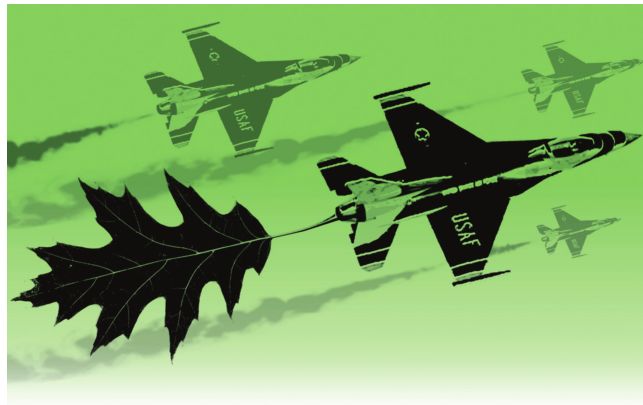
A green World War II might save the economy
DYSPEPSIANA | James Krohe Jr.
Certain Republicans have given way to fits of partisan bloodlust lately and tried to beat the current president with the bones of one of his long-dead Democratic predecessors. Franklin Roosevelt, they insist, deserves no credit for ending the Great Depression, since it was not FDR’s recovery policies that put Americans back to work but spending for World War II.
Even before Pearl Harbor, U.S. factories were humming, making trucks and tanks and planes purchased with borrowed U.S. funds for the Brits, the Chinese and the Russians under the Lend Lease program – an FDR initiative that had been resisted by Congress’s noisy band of isolationists, most of them Republican.
Since today’s Republican leaders disdain actual facts as the basis of settling such disputes, let us not argue FDR’s merits but recall instead the merits of government spending to stimulate an anemic economy. In the early 1940s, such spending of borrowed money stimulated a sluggish economy like no tax cut ever has. Knowing that, Christina D. Romer, chairwoman of President Obama’s first Council of Economic Advisers, asked in August, “If a global war was needed to return the economy to full employment then,” she wrote, “what is going to save us today?” Another war (only this time without the killing) would probably save us. But what sort of calamity would stir the nation to commit itself to a World War II-scale effort? The enemy was clear in each of the only two wars the U.S. has fought since Lincoln’s day that were worth fighting – the Civil War and World War II. Today it is not so easy to know who or what to fight, and in any event making modern weapons requires few workers of the kind that most need jobs.
How about attacking our dependence on fossil fuels? Such an effort would ease Big Oil’s grip on our national life, and also have the happy effect of reducing emissions of greenhouse gases. Alas, you have a better chance of getting a good martini in Jeddah than in getting such a scheme through Congress.
Americans might be forgiven for not paying any more attention to this year’s unprecedented torrential monsoon rains in Sindh or the invasion of the Antarctic abyss by giant red crabs than they did to, say, Japan’s seizure of Manchuria in 1931. But you would have thought that droughts and fires and torrential rains and heat waves and hurricanes and tornadoes in this country might have made it plain that our peaceful relations with nature might be fraying. However, science cannot prove that this heat wave or that freakish storm is attributable to human-induced climate change (even if – contrary to what many Americans insist on believing – the fact of global warming is accepted by 98 percent of the world’s climate scientists) and in any event the chances of significantly slowing global warming in time to avoid catastrophic climate change are very slim.
Ah, but if we can’t win that war, we will have a great deal of work to do to cope with the consequences of our defeat. As I noted recently in “Going against the flow“ (Aug. 11, 2011), the predicted effects of climate change include a doubling of intense storms such as the one that pelted the capital city in May of last year at a rate of three inches an hour. Such storms overwhelmed a stormwater system not designed for them.
Why not mobilize the nation’s resources, not only to fix leaks and blackouts and traffic jams and shipping delays, but overflowing sewers, seawalls and irrigation systems and levees and storm warning systems? It could be done, financed (as FDR’s stimulus programs could not be) at zero real interest rates on long-term bonds offered by some version of a national infrastructure bank.
Whether a war against a hostile climate could be fought well is much less clear. The U.S. is not actually very good at wars, having won none of the ones we have started, at home or abroad. In the “war” on terror to date we have managed to spend more than a trillion dollars to defend ourselves against a cutthroat gang of bumblers. We have spent similar sums waging war on drugs, when what we should have been doing is waging war on drug abuse. We are especially bad at fighting two wars at once. The war against an imagined menace in Vietnam sabotaged war against the all-too-real menace of poverty in this country. In Iraq we managed to not lose a war that didn’t need to be won at the expense of one in Afghanistan that did.
We face the same dilemma today. We cannot wage a war against unemployment that would at the same time arm the nation against fossil fuel shortages because one of our once-great political parties has already declared its own war – on Americans’ own government.
Contact James Krohe Jr. at [email protected].
Editor’s note
It’s time for federal officials, including Sen. Richard Durbin, to slow down the planned bloodletting at the U.S. Postal Service. It’s just dumb for postal officials to think they can balance the books by cutting $20 billion all at once. A cut of that size can’t happen without deterioration in service, which will erode the agency’s revenues, launching a death spiral. The local Postal Workers Union says it’s a done deal that the postal service plans to close the Cook Street post office, eliminating 300 Springfield jobs. A public hearing on the closure is scheduled for Dec. 28 at the Crowne Plaza. Mark your calendar as a day for outrage. –Fletcher Farrar, editor